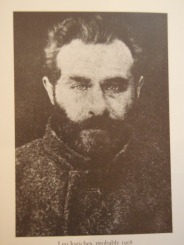Rosa Luxemburg in Warsaw; Prisoner No. 317 (left) and the infamous Pavilion X of the Warsaw Citadel, now a Museum.
On 28 June 1906, Rosa Luxemburg emerged from the infamous Pavilion X of the Warsaw Citadel after four months of imprisonment. Her crime was support for the 1905 Russian Revolution, which in Russian-occupied Poland continued well into 1906. Rosa returned to her native Warsaw from exile on 30 December 1905, after a two-day undercover journey on a train carying soldiers, using the alias ‘Anna Matschke’.
After two months of revolutionary activity in the city, she and her partner Leo Jogiches were dragged from their beds in the middle of the night and hauled off the overcrowded prison. Rosa to her friends in Berlin:
“On Sunday evening, the 4th, fate caught up with me: I was arrested…
I’m sitting here in the City Hall [prison], where “politicals”, common criminals, and the mentally ill are all crammed together. My cell, which is a jewel in this setting (an ordinary cell that in normal times holds one person), now holds fourteen guests, fortunately all politicals…
On the whole, for us here, during my lifetime things have gone superbly. I am proud of that. This was the only oasis in all of Russia where, in spite of storm and stress, the work and the struggle went forward as boldly and as merrily as it did, and progress was made… our work will be a model for later times in all of Russia.”
(Letter to Luise and Karl Kautsky, 13 March 1906)
After the Tsarist police raided her sister Anna’s house they were able to break Rosa’s alias. She was transferred from the ordinary prison first to the Pawiak Prison, and then to the X Pavilion of the Warsaw Citadel, reserved for the most ‘dangerous’ political prisoners. It was there that on 28 January 1886, when Rosa was 15, the leaders of the Proletariat Party were hanged by the Tsarist authorities.
‘Rosa’s brother Jozef visiting her in Warsaw Citadel’ in the 1986 film ‘Die Geduld der Rosa Luxemburg’
Rosa’s family, who were desperately trying to have her released, or at least lessen the charges against her, were allowed a visit. She described it many years later:
“It was just at the end of a six-day hunger strike in prison and I was so weak that the Commanding Officer of the fortress had more or less to carry me into the visitor’s room. I had to hold on with both hands to the wires of the cage, and this must certainly have strengthened the resemblance to a wild beast in a zoo. The cage was standing in a rather dark corner of the room, and my brother pressed his face against the wires. ‘Where are you? he kept asking, continually wiping away the tears that clouded his spectacles.”
(Letter to Sonja Liebknecht, 18 February 1917)
After appeals from her German social-democratic comrades (including August Bebel), threats of further anti-government attacks from Polish socialist organisations and the payment of a substantial bribe (2,500 rubles) and bail (3,000 rubles), Rosa was eventually released from the Citadel. Later, when she discovered that her friends and family had paid this money, Rosa was furious.
Eventually, on 30 July 1906, she was able to leave Warsaw and made to her way to Finland, via St. Petersburg to meet with the Russian social democrats, including V. I. Lenin. She wrote about her encounter with him that “It is a pleasure to talk to him, he is sophisticated and knowledgeable, with the kind of ugly mug I like so much”. Her experience in Warsaw influenced Rosa deeply, as was expressed particularly in her work ‘The Mass Strike, The Political Party and the Trade-Unions’ (1906).
A dishevelledLeo Jogiches after his arrest in Warsw; Prisoner No. 318 (left) and after his escape, c. 1908
Rosa eventually returned to Berlin on 13 September 1906, after a sea voyage via Sweden. On 12 December, she was sentenced to two-months in prison by the German authorities, ever keen to work in conjunction with the Tsarist police across the border. In January 1907, Rosa was sentenced by the Warsaw court in absentia. Leo Jogiches, who had not managed to secure his release, was sentenced to eight years hard labour in Siberia. Three months later, he escaped.






Pingback: A visit to the Pavilion X of the Warsaw Citadel (where Rosa Luxemburg was imprisoned during the 1905 Revolution) | rosaluxemburgblog
who was the Fatty in Rosa’s letters, who was sentenced wit Leo to work camp?
Hello,
Luxemburg often referred to Parvus (Alexander Helphand) as “fatty” – perhaps this is who you mean?
Many thanks,
Rory